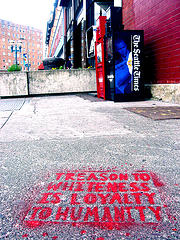
In explaining the purpose of a “whiteness studies” course—the kind offered at dozens of colleges and universities in the United States—Alex P. Kellogg of CNN.com writes:
The field argues that white privilege still exists, thanks largely to structural and institutional racism, and that the playing field isn’t level… educators teach how people of different races and ethnicities often live very different lives… The field has its roots in the writing of black intellectuals such as W.E.B. DuBois and author James Baldwin.
Still, “In the past, detractors have said the field itself demonizes people who identify as white.” So, then, how did the courses manage to continue, and why are they seemingly on the way out now?
Eduardo Bonilla-Silva, a sociologist at Duke and the University of Pennsylvania, tells the reporter:
Having Obama is, in a curious way, putting us behind… You have a growing racial apathy. People are telling you, I don’t want to hear about race, because we’re beyond that… But we still have a white America and a Black America.
Another sociologist, Charles Gallagher of Philadelphia’s La Salle University, said that he still has to convince his students that inequality exists. “Gallagher, whose latest book Retheorizing Race and Whiteness in the 21st Century was published last year,” writes Kellogg, ” is teaching intro to sociology and urban sociology classes this semester, and while neither is strictly about race, he says he will make a point to talk about modern day racism and white privilege.” Still, “he expects his students—and increasingly, some who are black—will be there ready to push back, particularly on the notion that race still determines your lot in life.” Gallagher asks:
How do we talk about race or racism in the United States if people think racism is gone?
The article moves on to discussing whether, rather than being privileged, whites, as some suggest, are actually racially oppressed. Charles Mills, a philosopher at Northwestern, argues, Kellogg says, “that whites in particular have a self-interest in seeing the world as post-racial. In that world, everyone has an equal opportunity to succeed… your success in life [is] not determined by race, but by how hard you work.”
Even as classes on whiteness studies instead seem to be dissolving into interdisciplinary race courses which take the time out to discuss persistent white privilege, academics tell CNN.com that “in the past, conservatives derided whiteness studies as anti-white, but the sharp vitriol against the discipline has largely subsided,” and the field “continues to evolve.” As Kellogg concludes, “While the filed is still little known in some corners, and criticized as being obsolete in others, proponents of… whiteness studies say that’s all part of progress.”

Comments 5
Teaching Privilege to the Privileged » Citings and Sightings | Whiteness & White Privilege | Scoop.it — February 2, 2012
[...] background-position: 50% 0px; background-color:#222222; background-repeat : no-repeat; } thesocietypages.org (via @SH_lelabo) - Today, 11:05 [...]
Hannah — February 12, 2012
Racial inequality definitely still exists in schools today, and those inequalities lead to poorer academic performance. To get an alternate view of "teaching privilege to the privileged," check out the book "Hope and Despair in the American Society: by Gerald Grant. It gives an insight into inequalities in the education system in reference to class and economic standing as opposed to race. It's a different source, but it still addresses academic inequalities.
The Educated and the Priviliged « Business Government & Society III — February 12, 2012
[...] Educated and the Priviliged This post from The Society Pages stuck with me because the entire time I was reading it, I was constantly thinking of a book that I [...]
Friday Roundup: July 19, 2013 » The Editors' Desk — July 19, 2013
[...] Related: ”Teaching Privilege to the Privileged.” Professors weigh in on courses meant to make white privilege visible even in an ostensibly “colorblind” age. [...]
Excellent Articles About The Concept Of Privilege | Lynley Stace — August 20, 2013
[...] Teaching Privilege To The Privileged from TSP [...]